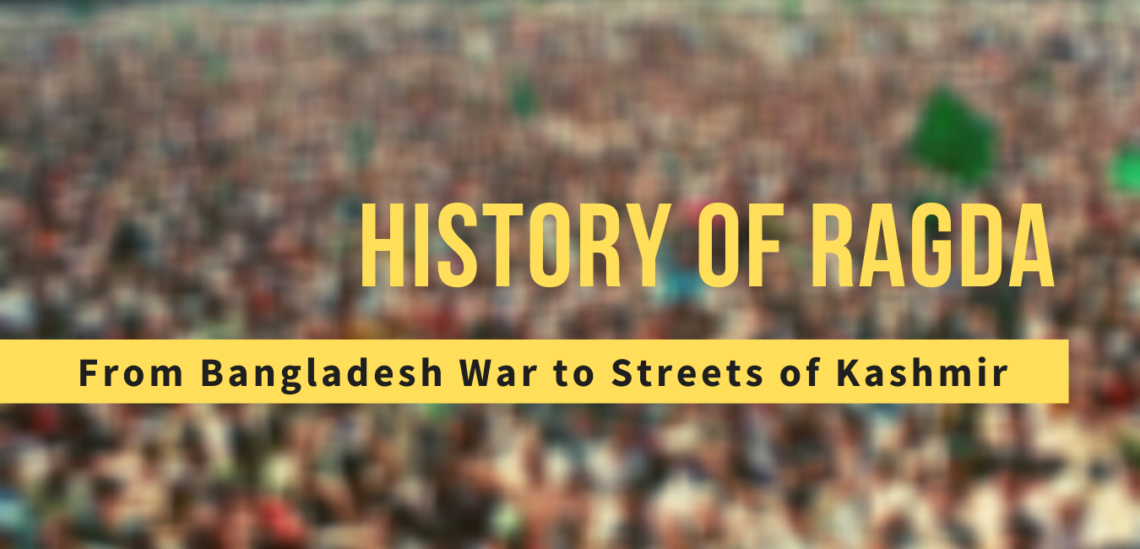In Kashmir, years are known by natural disasters or significant political events. For example, the 1990s are known as Tehreek which means the revolution. 2019 will forever be known as ‘Article’ alluding to the abrogation of Article 370. 2005 is known as the ‘Bunyul’ referring to the earthquake and 2014 is known as ‘‘Sailaab’ after the floods that sent Kashmir into a deluge.
The Year of Ragda
2008-10 which witnessed the biggest mass-demonstrations in Kashmir since the 1990s is known by ‘Ragda,’ which is a protest dance. Ragda means to stomp with your feet on to something. The protesters form a circle and one enforcer stands in the middle. The enforcer starts with the chant, ‘girti hui dewaar ko’ give the falling walls, the protesters respond with, ‘ek dhakka aur do’ one more push. Then it starts with slogans that are improvised as it goes along, with protesters closing on the circle and synchronized stomping on the ground. They hold each other on the shoulders, akin to how Rof, a Kashmiri folk dance is performed except in Rof, there’s no stomping but moving legs back and forth.
The demonstrations would attract hundreds and thousands of people. Ragda was done at every rally. Since then it has become a part of Kashmir’s political demonstrations. In fact, it has been used by the pro-Indian dispensation of the National Conference for their purpose as well.
One of the Ragda dances which became viral was of a transgender who was acting as an enforcer while surrounded by women who responded to the chants.
Origins
The origins of this political dance are believed to have emerged from Kot Balwal Jail in Jammu. According to an activist of the Hurriyat Conference, it was started by prisoners from Pakistan which later influenced their fellow Kashmiri prisoners. One of them Masrat Alam Bhat, popularised it after he was released. He was one of the most influential protest leaders during the 2008 and 2010 uprisings.
Dr Mubeen Shah, renowned civil society activist recalls, “the first protest which I led as the Vice President of the Action Committee against Land Transfer as our President Mian Qayum was under house arrest. I saw the power of Ragda of galvanising people. At every bunker in the interior city young people would do Ragda right up to the burial place.”
One of the first protests in 2008 was when a driver was lynched in Jammu by a mob. Shah says, “press enclave in Lal Chowk to Hawal and the protests started with few hundreds and reached thousands when it winded through the city to reach Hawal.”
Girti Hui Deewar Ko which is the first chant is from a political poem by Ali Arshid Mir, a Pakistani poet in the 1970s. His poems were immensely popular during the political uprisings in the country. Girti Hui Deewar Ko is an anti-imperialist and anti-dictatorship poem.
Ragda the song is inspired by the war anthem of Inayat Hussain Bhatti, who shot to stardom through his acting and singing abilities. He sang the Punjabi war anthem ‘Thar Ragra’ during the 1971 war which ended up in defeat for Pakistan as they lost East Pakistan which later became Bangladesh.
Inayat Hussain Bhatti wrote many patriotic songs for his country. He also joined Pakistan’s People’s Party under the then Prime Minister Zulfiqar Ali Bhutto. He participated in elections under the Zia regime and lost.
However, his last political innings was in Kashmir’s oldest political party, the Muslim Conference. It headed by former President of Azad Jammu & Kashmir Sardar Abdul Qayoom Khan who participated in the Poonch revolt against the Dogra Regime and later joined the first Kashmir war between India and Pakistan.
Ragda which was a patriotic Pakistani song during the 1971 war which led to the independence of Bangladesh that made its way into the prisons of Kashmir where it was metamorphosed into a protest dance demanding independence.
